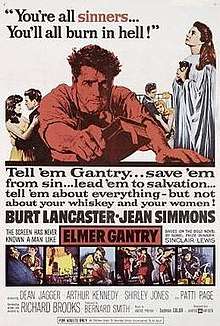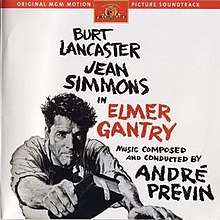Elmer Gantry (film)
Elmer Gantry is a 1960 American drama film about a con man and a female evangelist selling religion to small-town America. Adapted by director Richard Brooks, the film is based on the 1927 novel of the same name by Sinclair Lewis and stars Burt Lancaster, Jean Simmons, Arthur Kennedy, Shirley Jones and Patti Page.
| Elmer Gantry | |
|---|---|
 theatrical poster | |
| Directed by | Richard Brooks |
| Produced by | Bernard Smith |
| Screenplay by | Richard Brooks |
| Based on | Elmer Gantry 1927 novel by Sinclair Lewis |
| Starring | Burt Lancaster Jean Simmons Arthur Kennedy Shirley Jones Patti Page |
| Music by | André Previn |
| Cinematography | John Alton |
| Edited by | Marjorie Fowler |
| Distributed by | United Artists |
Release date |
|
Running time | 146 minutes |
| Country | United States |
| Language | English |
| Budget | $3 million |
| Box office | $5.2 million (US/ Canada rentals) [1] |
Elmer Gantry was nominated for five Academy Awards in 1961, including Best Picture and Best Score. It won Best Actor for Lancaster, Best Supporting Actress for Jones, and Best Adapted Screenplay. Jean Simmons was nominated for the best actress Golden Globe award.
The movie presents fewer than 100 pages of the novel Elmer Gantry, deleting many characters and fundamentally changing the character and actions of female evangelist Sister Sharon Falconer, as played by Simmons. The character of Sharon Falconer was loosely based on elements in the career of the Canadian-born American radio evangelist Aimee Semple McPherson, who founded the Pentecostal Christian denomination known as the International Church of the Foursquare Gospel in 1927.[Note 1] In addition, a plot point from the end of the novel is incorporated into Gantry's and Lulu Bains's relationship, fundamentally changing the fates of both characters.
Plot
Elmer Gantry (Burt Lancaster) is a hard-drinking, fast-talking traveling salesman with a charismatic personality who infuses biblical passages and fervor into his pitches as a way to ease and collect money. He is drawn to the roadshow of Sister Sharon Falconer (Jean Simmons) and is immediately attracted to the revivalist's saintly aura. As the troupe leaves town for Kansas, Gantry sweet talks her naive assistant, Sister Rachel (Patti Page), into disclosing information regarding Falconer's past, which he uses to con his way into her good graces. He joins the troupe preaching "Christ in commerce" and how he is a saved salesman.
Gantry and Falconer develop what her manager, Bill Morgan (Dean Jagger), calls a "good cop/bad cop" routine, with Gantry telling the audience members that they will burn in Hell for their sins and Falconer promising salvation if they repent. Because of Gantry's fire and brimstone sermons, the group comes to the attention of the church council in Zenith, Winnemac, a larger city. Though Morgan does not think Falconer is ready to preach outside of the smaller venues, Gantry convinces her to go to Zenith. They meet with the church leaders, most of whom are wary of turning religion into a spectacle as Gantry does, but he convinces them that the churches must earn money to stay open, and can increase their membership only if unchurched citizens are first won over to Christ by attending Gantry's colorful revival meetings.
Travelling along with Falconer is the big-city reporter, Jim Lefferts (Arthur Kennedy). Lefferts is torn between his disgust for religious hucksterism and his admiration for Gantry's charm and cunning. As Gantry's sermons bring Falconer's group to larger venues, Lefferts writes a series of articles labeling the revival a sham and reveals that neither Falconer nor Gantry has any credentials. Falconer eventually admits to Gantry that her real name is Katie Jones and that her origins are humbler than she publicly admits. Falconer also becomes Gantry's lover and loses her virginity to him.
The success of the Falconer-Gantry team comes to the attention of Lulu Bains (Shirley Jones), who became a prostitute when her youthful affair with Gantry ruined her standing in her minister father's eyes, and Gantry ditched her. Acting as a moralist, Gantry unwittingly invades the brothel where Lulu works, but sends the prostitutes out of town when he sees Lulu. When he meets Lulu privately after she phones him, Lulu wants revenge against Gantry for running out on her in Kansas. However, her love for Gantry returns when confronting him and they embrace. A hidden photographer planted by Lulu records their embrace but Gantry's love for Falconer prevents him from consummating his relationship with Lulu. Lulu proceeds to frame Gantry out of jealousy for his love for Falconer. Lulu blackmails him, and Falconer is asked to bring $25,000 ($348,906.61 in 2017 dollars)[2] in exchange for the negatives of incriminating pictures. Falconer brings the money, but Lulu refuses to accept; the pictures are then printed in the front page of the town's newspaper.
Lulu had at first offered Lefferts the exclusive story of Gantry's supposed sexual indiscretion, but he refused, shrugging the pictures off as merely proof that Gantry is as human as anyone else. An angry mob ransacks the tent revival following the publication of the incriminating photos in another newspaper, with Lulu witnessing Gantry's humiliation. As the mob curses Gantry and smears him with eggs and produce, Lulu is emotionally shaken and flees the scene. She returns to the brothel, which is now in a dilapidated state from Gantry's publicity stunt. Her pimp is there to collect the $25,000, but when Lulu tells him she did not take Falconer's money, he beats her. Gantry comes to Lulu's rescue. He disposes of the pimp and apologizes to Lulu, who then publicly confesses to having framed Gantry.
Gantry returns to Falconer, as a capacity crowd of followers fills her new tabernacle, following Gantry's redemption in the press. Falconer declines Gantry's request to give up her soul-saving ventures, insisting that she and Gantry were brought together by God to do His work. After Falconer appears to cure a follower (Max Showalter) of deafness, a fire that had been smoldering erupts suddenly. Unable or unwilling to see past her own religious zeal as flames engulf her tabernacle, Falconer remains on the premises and dies. The next day, Gantry, saddened by Falconer's death, leads a spiritual with her followers after their prodding. Morgan asks Gantry to continue Falconer's ministry, but Gantry replies, "When I was a child, I understood as a child and spoke as a child. When I became a man, I put away childish things" (1 Corinthians 13:11). His valise in one hand, Bible in the other, and a smile on his face, Gantry strides away.
Cast
- Burt Lancaster as Elmer Gantry
- Jean Simmons as Sister Sharon Falconer
- Arthur Kennedy as Jim Lefferts
- Dean Jagger as William L. Morgan
- Shirley Jones as Lulu Bains
- Patti Page as Sister Rachel
- Edward Andrews as George F. Babbitt (credited as Ed Andrews)
- John McIntire as Rev. John Pengilly
- Hugh Marlowe as Rev. Philip Garrison
- Joe Maross as Pete
- Philip Ober as Rev. Planck
- Barry Kelley as Police Capt. Holt
- Wendell Holmes as Rev. Ulrich
- Dayton Lummis as Eddington, newspaper publisher
- Max Showalter as Deaf Man (uncredited)
- Harry Antrim as salesman in a speakeasy (uncredited)
- Barbara Luna as a prostitute (uncredited)
- Jean Willes as a prostitute (uncredited)
- John Qualen as Sam, a storekeeper (uncredited)
Soundtrack
| Elmer Gantry | |
|---|---|
 | |
| Soundtrack album by | |
| Released | August 25, 1998 |
| Label | Rykodisc |
A remastered and enhanced soundtrack was released on CD on August 25, 1998.
All compositions by André Previn.
- "Main Title" (1:45)
- "Long Distance" (1:38)
- "Mr. Babbitt" (3:15)
- "Lulu's Room" (2:49)
- "Do You Believe" (1:55)
- "Not As My Lover" (1:10)
- "Under the Pier" (3:14)
- "Shall We Gather At the River" (1:43)
- "Kiss Me Goodbye" (4:06)
- "Stand Up for Jesus" (1:16)
- "Elmer and Lulu" (1:25)
- "End Title" (1:35)
- "Orchestral Suite" (2:56)
- "Onward Christian Soldiers (Instrumental)"(1:25)
- "Shall We Gather At the River" (1:43)
- "Stand Up for Jesus" (1:15)
- "I'm On My Way" (Burt Lancaster – Vocal) (2:47)
Awards and nominations
See also
References
In-line note
- From the AFI Catalog for this film under the History tab: A 21 Nov 1958 memo in the PCA file specifies that [George] Shurlock considered the film’s first draft to be in violation of the Code. In response (and in accordance with Lancaster’s age), according to a modern interview with Brooks, the writer-director adapted the story to focus on Gantry’s middle years, changed Falconer into a sincerely religious figure, converted “Jim Lefferts” from a seminary student to an atheist reporter and, most importantly, portrayed Gantry as not an ordained minister. This change sidestepped Code restrictions disallowing ministers to be portrayed in a negative light. In a 24 Nov 1958 memo, Brooks noted that he retained the story’s 1920s setting in order to avoid any identification with contemporary religious leaders.
Notes
- "All-Time Top Grossers", Variety, 8 January 1964 p 69
- http://www.bls.gov/data/inflation_calculator.htm BLS Inflation Calculator
- "Oscars.org -- Elmer Gantry" Archived 2013-11-19 at Archive.today. Academy of Motion Picture Arts and Sciences. Retrieved November 19, 2013.
Bibliography
- Wheeler Dixon. "Cinematic Adaptations of the Works of Sinclair Lewis." Sinclair Lewis at 100: Papers Presented at a Centennial Conference. Ed. Michael Connaughton. St. Cloud: St. Cloud State University, 1985. 191–200.
External links
- Elmer Gantry on IMDb
- Elmer Gantry at Rotten Tomatoes
- Elmer Gantry at the TCM Movie Database
- Elmer Gantry at AllMovie
- Elmer Gantry at the American Film Institute Catalog
- "Elmer Gantry, a Flawed Preacher for the Ages" at NPR All Things Considered (February 22, 2008).